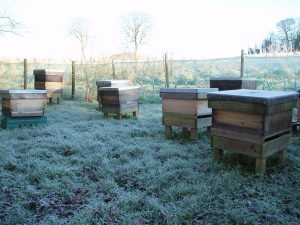
We are approaching the danger months for our colonies. In my experience there aren’t many colony losses until February or March. The main reasons for colonies dying out are beekeeper error or the weather. As the weather has been mild so far this winter bees have been more active than normal and therefore have used more of their stores. Or perhaps colonies weren’t fed sufficiently in autumn.
So it is important to heft colonies and feed with fondant if they are becoming light. It is best to give around 1kg of fondant at a time to keep the bees ticking over. Wrap the fondant in cling film and make a hole the size of a 50p coin. Place this hole over a feed hole in the crown board so bees can access the fondant through the gap in the film.
The temperature is too low now and probably will be for a while yet to feed syrup to bees. Daytime temperatures need to be around mid teens before bees will take syrup down readily. However, if spare frames of stores were kept to one side last autumn one or more can be placed in a colony that is running low. Obviously this manoeuvre needs to be carried out as quickly as possible at this time of year but it can save a colony from starving.
There isn’t much we can do about the weather but we can shelter hives out of the wind. This is the one time of the year when colonies can be moved less than 3 miles as bees will re-orientate when confined to the hive for many days. So if a colony would benefit from more shelter which is a short distance away, now is a good time to do this. Avoid jolting hives when moving them as the movement can cause bees to foul inside the hive which is to be avoided if at all possible. Bees will clean up the mess which can then spread disease, e.g. nosema.
Around the middle of March (weather depending) I shall start giving my bees a protein supplement in the form of Vita Feed. This is to boost egg laying by the queen so that a good work force will be available for the rape flow. Although the acreage for rape is lower this winter there are fields around the county and I like to build colonies up in readiness for this crop.
Wally Thrale
